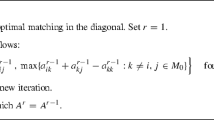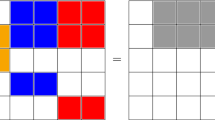Abstract
A coalition game with a finite number of players in which initial coefficients of linear payoff functions are subject to perturbations is considered. For any efficient solution which may appear in the game, appropriate measures of the quality are introduced. These measures correspond to the so-called stability and accuracy functions defined earlier for efficient solutions of a generic multiobjective combinatorial optimization problem with Pareto and lexicographic optimality principles. Various properties of such functions are studied. Maximum norms of perturbations for which an efficient in sense of equilibrium solution preserves the property of being efficient are calculated.
Similar content being viewed by others
References
Bukhtoyarov, S., Emelichev, V., & Stepanishina, Y. (2006). Stability of discrete vector problems with the parametric principle of optimality. Cybernetics and Systems Analysis, 39, 604–614.
Emelichev, V., Girlich, E., Nikulin, Y., & Podkopaev, D. (2002). Stability and regularization of vector problems of integer linear programming. Optimization, 51, 645–676.
Ehrgott, M. (2000). Multicriteria optimization. Berlin: Springer.
Greenberg, H. (1998). An annotated bibliography for post-solution analysis in mixed integer and combinatorial optimization. In D. Woodruff (Ed.), Advances in computational and stochastic optimization. Logic programming and heuristic search (pp. 97–148).
Goldengorin, B., Jäger, G., & Molitor, P. (2006). Tolerances applied in combinatorial optimization. Journal of Computer Science, 2, 716–734.
Libura, M. (1999). On accuracy of solution for combinatorial optimization problems with perturbed coefficients of the objective function. Annals of Operation Research, 86, 53–62.
Libura, M. (2000). Quality of solutions for perturbed combinatorial optimization problems. Control and Cybernetics, 29, 199–219.
Libura, M., & Nikulin, Y. (2004). Stability and accuracy functions in multicriteria combinatorial optimization problem with Σ-MINMAX and Σ-MINMIN partial criteria. Control and Cybernetics, 33, 511–524.
Libura, M., & Nikulin, Y. (2006). Stability and accuracy functions in multicriteria linear combinatorial optimization problems. Annals of Operations Research, 147, 255–267.
Nash, J. (1950). Equilibrium points in n-person games. Proceedings of the National Academy of Sciences, 36, 48–49.
Nash, J. (1951). Non-cooperative games. Annals of Mathematics, 54, 286–295.
Pareto, V. (1909). Manuel d’ecoonomie politique. Paris: Qiard.
Steuer, R. (1986). Multiple criteria optimization: Theory, computation and application. New York: Wiley.
Author information
Authors and Affiliations
Corresponding author
Rights and permissions
About this article
Cite this article
Nikulin, Y. Stability and accuracy functions in a coalition game with bans, linear payoffs and antagonistic strategies. Ann Oper Res 172, 25–35 (2009). https://doi.org/10.1007/s10479-008-0471-6
Published:
Issue Date:
DOI: https://doi.org/10.1007/s10479-008-0471-6




